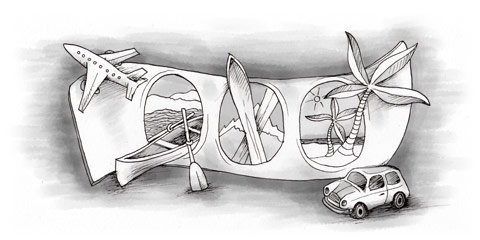Born to be wild
Moving to a new country doesn’t mean you have to give up on your habits and hobbies and a true biker's love for the road usually doesn’t fade. Lucky for you, the Iberian peninsula offers adventures for just about every taste: the Spanish Pyrenees with it’s pass roads and hairpin bends, the long roads from Barcelona to Valencia with mind-blowingly beautiful views of the coast or a tour through the diverse landscape of Andalusia being only a few examples.
The best thing is that there are a lot of motorbike aficionados (fans) in Spain, so you could join one of the many clubs or attend events to meet like-minded new friends.
On the road
Before you hit the road, you should of course familiarise yourself with the local law and safety regulations. If you are an experienced driver, most of it will be old news to you, but we also listed some regulations that might strike you as unusual:
- Always carry your driving licence, vehicle registration document and European Accident Form with you
- If you need prescription glasses, you are required to carry a second pair with you
- Don’t max out the speed limit (50 Kph on urban roads, 100/90 Kph on non-urban roads and 120 Kph on motorways)
- You motorcycle must be of at least 125cc to be allowed on a motorway
- Be very cautious when slowing down before a zebra crossing - in Spain it is not as common for vehicles to always stop.
If you already own a motorbike or scooter, and want to import it or plan on buying a new one, be aware that third-party insurance is mandatory in Spain. There is a wide range of insurance companies in Spain, but you might want to consider one that offers specific policies for expats and full services in English, like Linea Directa .
Permits and inspections
As always, with fun and adventure also comes some daunting paperwork that needs to get done. And even if there might be a lot of red tape to navigate, make sure to get all of them in order.
All motorcycles must be registered with the provincial traffic department and have manufacturer’s certificate, industry certificate, appraiser’s certificate, as well as town hall registration.
Don’t forget to get the necessary technical inspection (inspección técnica de vehículos/ITV); here is a link to where you can get that done. For mopeds, scooters and motorcycles the first inspection is due three years after registration, and then every two years. After 10 years, inspections must be done annually.




